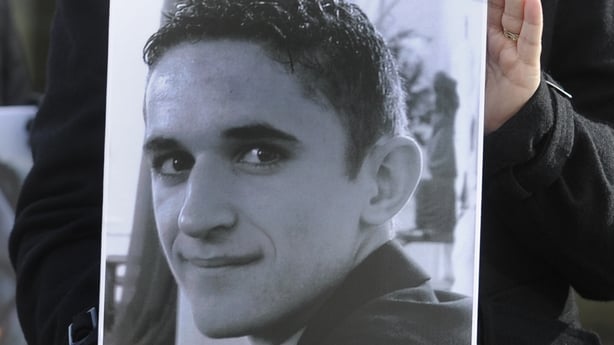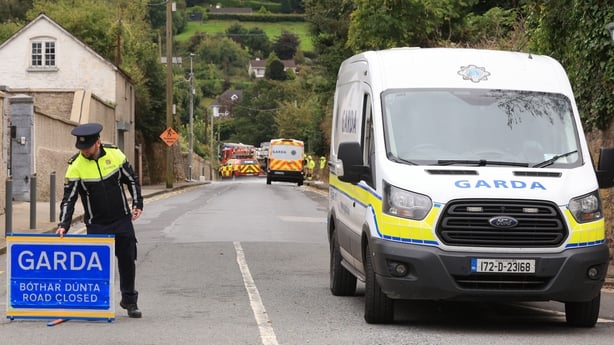The rising number of fatalities on the country's roads has led to calls for greater enforcement of traffic laws and an enhanced focus on driver behaviour.
The latest figures from An Garda Síochána show that, up to this weekend, 165 people have died on the roads since the beginning of the year.
That compares with a death toll of 155 people for all of 2022.
A third of those killed in 2023 have been under the age of 25, a quarter have been pedestrians, while passengers account for a fifth of fatalities.
There is always a danger that the impact of such data diminishes in a fog of facts and figures.
But if you extrapolate the significance of one death, to take in immediate family members, friends, work or school colleagues, acquaintances, neighbours and the wider community network, you soon get a sense of the volume of people that are impacted in some way by the loss of one life.
Consider then the others, dealing with life changing injuries in the aftermath of a serious crash.
Put simply, there are tens of thousands of people touched by the carnage on our roads.
Gardaí, politicians and campaigners have all expressed concern at the increase in deaths this year.
But calls for change, public safety campaigns, penalty points or enhanced policing mean little if road users do not alter and amend their individual actions.
Donna Price lost her son Darren in a road collision in 2006. It led to her founding the Irish Road Victims Association (IRVA), an organisation that provides support and assistance to those who find themselves impacted by sudden tragedies.
"I know the utter devastation of just one of those deaths. Your whole life crumbles around you and it’s never ever the same again.
"It becomes the defining moment of your life, your 'new normal’," she said.
"You learn how to cope, and you try to pick up the pieces, but you never get over it".
Ms Price said that the recent increase in road deaths is soul destroying, and that the situation is worsened by its randomness.
"This can happen to anybody - you can be the most law-abiding road user and you can still be killed by somebody else breaking the law.
"But there’s no excuse for this. We can’t have any level of acceptable deaths on the roads."

The IRVA says that high visibility policing is the only way to effectively tackle the problem.
While there has been a reduction in the number of officers allocated to roads policing, gardaí say the numbers deployed in that area "remain consistently higher" as a percentage of the entire organisation. They point out that all members of the force play a role in detection and enforcement on a daily basis.
But fewer dedicated staff means less visible policing.
According to Ms Price, without gardaí on the roads, "we simply don’t have an effective deterrent".
"We need to address the cohort who simply don’t care and nothing is going to stop them unless they see a garda checkpoint - even then that might not work - but we need to look at this with a real sense of urgency now".
Ms Price suggests that legislative changes could also play a part, such as lowering the threshold at which drivers can lose their licence for speeding or using a mobile phone.

She added that this approach has been effective in terms of drink driving and could be applied elsewhere.
The Government says it is prioritising "high-impact actions" in response to the latest trends. These include a review of speed limits and reforms of the penalty points system.
Pre-legislative scrutiny has been waived for the 2023 Road Traffic Measures Bill, which may be in place by the end of the year.
It will allow the Minister for Transport to set higher penalty points to be imposed for breaches during specified periods, such as bank holidays, when there are typically more collisions.
It will also make drug testing mandatory at the scene of a collision and legislate for changes to speed limits on certain routes.
The latest focus on this topic comes just weeks after the Road Safety Authority (RSA) launched Vision Zero, which aims that there would be no road deaths or serious injuries on Irish roads by 2050.
In an interview on RTÉ Radio One this week, RSA chairperson Liz O’Donnell said she "wholeheartedly" backed calls for more speed cameras.
"There has to be an all of Government approach to this disaster."
She said such measures act as a deterrent and she expressed support for plans to increase the number of average speed cameras on the country’s roads.
These work by registering vehicles at separate locations on a stretch of road, from point A to point B. If the car reaches point B too quickly, the monitoring technology records a violation, leading to penalties being imposed on the driver.
We need your consent to load this rte-player contentWe use rte-player to manage extra content that can set cookies on your device and collect data about your activity. Please review their details and accept them to load the content.Manage Preferences
Read more: 80% of road deaths occur on 80-100km/h roads, gardaí
Pedestrian road deaths on course for 15-year high
RSA urges change in driver behaviour to reduce deaths
Since the technology was installed in the Dublin Port tunnel, incidents of speeding are now less than 1%, down from 55% beforehand.
Ms O’Donnell also cited the experience on a section of the M7, in Co Tipperary, where static speed cameras were introduced last year.
She said this had led to compliance with restrictions of 99.7%.
"These cameras change people’s behaviour and deter them from speeding," she said.
But enforcement and detection requires investment and the RSA says without more resources, the task will be complicated.
"There has to be an all of Government approach to this disaster," Ms ODonnell said.
"We have made such good progress over the years reducing fatalities and serious injuries but since 2021, it’s been going upwards.
"The next two months are dangerous months on the road, with dark evenings and bad weather. We need additional resources towards the end of the year and all of next year.
"We need to completely up our game."
There is broad agreement on what needs to be done and consensus on the need for some radical changes, along with a range of initiatives in train to try and reduce fatalities.
But for many, it’s all too late. Such as those lost and those impacted by what Ms Price called "a pandemic of preventable deaths."







